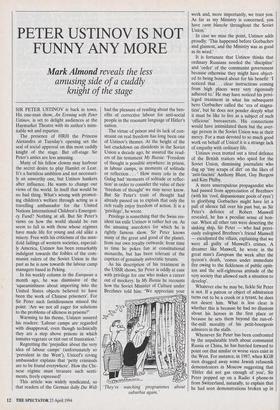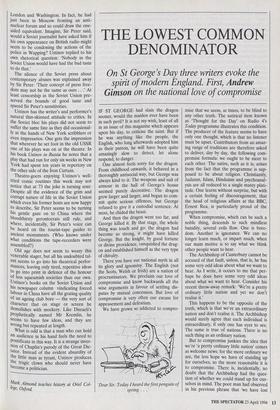PETER USTINOV IS NOT FUNNY ANY MORE
Mark Almond reveals the less amusing side of a cuddly knight of the stage SIR PETER USTINOV is back in town. His one-man show, An Evening with Peter Ustinov, is set to delight audiences at the Haymarket Theatre with its author's inim- itable wit and repartee.
The presence of HRH the Princess Alexandra at Tuesday's opening set the seal of social approval on this most cuddly knight of the stage. But off-stage Sir Peter's antics are less amusing.
Many of his fellow clowns may harbour the secret desire to play Hamlet or Lear. It's a harmless ambition and not necessari- ly an unworthy one, but Ustinov hankers after influence. He wants to change our views of the world. In itself that would be no bad thing. What's wrong with promot- ing children's welfare through acting as a travelling ambassador for the United Nations International Children's Emergen- cy Fund? Nothing at all. But Sir Peter's views on how the world should be run seem to fall in with those whose regimes have made life for young and old alike a misery. Free with his criticisms of the man- ifold failings of western societies, especial- ly America, Ustinov has been remarkably indulgent towards the foibles of the com- munist rulers of the Soviet Union in the past as he is now towards the labour camp managers based in Peking.
In his weekly column in the European a month ago, he was dismissive of the `squeamishness about importing into the United States objects believed to have been the work of Chinese prisoners'. For Sir Peter such fastidiousness missed the point: 'Are we not all eager for solutions to the problems of idleness in prisons?'
Warming to his theme, Ustinov assured his readers: 'Labour camps are regarded with disapproval, even though technically they are a step above prisons in which inmates vegetate or riot out of frustration.'
Regretting the 'prejudice about the very idea of labour camps' (unfortunately so 'prevalent in the West'), Unicef s roving ambassador explains that 'petty criminals are to be found everywhere'. How the Chi- nese regime must treasure such senti- ments, freely expressed!
This article was widely syndicated, so that readers of the German daily Die Welt had the pleasure of reading about the ben- efits of corrective labour for anti-social people in the resonant language of Hitler's nation.
The virtue of prison and its lack of con- straint on real freedom has long been one of Ustinov's themes. At the height of the last crackdown on dissidents in the Soviet Union a decade ago, he assured the read- ers of his testament My Russia: 'Freedom of thought is possible anywhere: in prison, in labour camps, in moments of solitude or reflection . . . ' How many zeks in the Gulag had 'moments of solitude or reflec- tion' in order to consider the value of their `freedom of thought' we may never know. But Sir Peter's train of thought had already passed on to explain that only the rich really enjoy freedom of action. It is a `privilege', he wrote.
Privilege is something that the Swiss res- ident tax exile Ustinov is rather hot on. As the amusing anecdotes for which he is rightly famous show, Sir Peter knows many of the great and good of the planet, from our own royalty outwards: from time to time he pokes fun at constitutional monarchs, but has been tolerant of the caprices of genuinely autocratic tyrants.
As his description of his treatment in the USSR shows, Sir Peter is oddly at ease with privilege for one who makes a career out of mockery. In My Russia he recounts how the Soviet Minister of Culture under Brezhnev told him: 'We appreciate your `They're watching programmes about suburbia again.' work and, more importantly, we trust you. As far as my Ministry is concerned, you have carte blanche throughout the Soviet Union.'
In case we miss the point, Ustinov adds proudly: 'This happened before Gorbachev and glasnost, and the Ministry was as good as its word.'
It is fortunate that Ustinov thinks that ordinary Russians needed the 'discipline' and 'order' of the communist government because otherwise they might have object- ed to being bossed about for his benefit: 'I noticed that . . . clear instructions coming from high places were very rigorously adhered to.' He may have noticed his privi- leged treatment in what his subsequent hero Gorbachev called the 'era of stagna- tion', but he does not ponder deeply what it must be like to live as a subject of such `officious' bureaucrats. His connections would have intimidated them but the aver- age person in the Soviet Union was at their mercy. For a man devoted to so much good work on behalf of Unicef it is a strange lack of empathy with ordinary life.
Ustinov even trotted out a tired defence of the British traitors who spied for the Soviet Union, dismissing journalists who dug up 'tiny scraps of dirt' on the likes of `anti-fascists' Anthony Blunt, Guy Burgess and Kim Philby.
A more unscrupulous propagandist who had passed from appreciation of Brezhnev (with his 'cool, dispassionate pools of eyes') to glorifying Gorbachev might have let a pall of silence fall over his past but, as Sir Peter's defence of Robert Maxwell revealed, he has a peculiar sense of hon- our. When all other rats were deserting the sinking ship, Sir Peter — who had previ- ously eulogised Brezhnev's friend Maxwell — exculpated the villain, explaining that we were all guilty of Maxwell's crimes. A dreamer like Maxwell, he wrote in the great man's European the week after the tycoon's death, 'comes under immediate fire owing to the fickleness of public opin- ion and the self-righteous attitude of the very society that allowed such a situation to develop'.
Whatever else he may be, fickle Sir Peter is not. If a patron or object of admiration turns out to be a crook or a tyrant, he does not desert him. What is less clear is whether this is because he had no illusions about his heroes in the first place or because he sets them beyond the run-of- the-mill morality of his petit-bourgeois admirers in the stalls.
Whenever Sir Peter has been confronted by the unpalatable truth about communist Russia or China, he has hurried forward to point out that similar or worse vices exist in the West. For instance, in 1987, when KGB men dragged away some Jewish refusenik demonstrators in Moscow suggesting that `Hitler did not gas enough of you', Sir Peter popped up on a Radio 4 phone-in from Switzerland, naturally, to explain that he had seen demonstrations broken up in London and Washington. In fact, he had just been in Moscow fronting an anti- nuclear forum and so could draw the one- sided equivalent. Imagine, Sir Peter said, would a Soviet journalist have asked him if his own appearance on British radio might seem to be condoning the actions of the police in Wapping? Ustinov replied to his own rhetorical question: 'Nobody in the Soviet Union would have had the bad taste to do that.'
The silence of the Soviet press about contemporary abuses was explained away by Sir Peter: 'Their concept of press free- dom may not be the same as ours . ..' At least censorship in the Soviet Union pre- served the bounds of good taste and spared Sir Peter's sensitivities.
Ustinov has the writer's and performer's natural thin-skinned attitude to critics. In the Soviet bloc' his plays did not seem to suffer the same fate as they did occasional- ly at the hands of New York scribblers or even impresarios. One gets the impression that wherever he set foot in the old USSR one of his plays was on at the theatre. In his book Ustinov in Russia he notes that a Play that had run for only six weeks in New York had spent ten years in repertory on the other side of the Iron Curtain.
Theatre-goers enjoying Ustinov's well- tried comic routines this week may not notice that at 73 the joke is turning sour. Despite all the evidence of the grim and corrupt nature of life in the Soviet Union which even his former hosts are now happy to describe, Sir Peter seems to be turning his gentle gaze on to China where the bloodthirsty gerontocrats still rule, and where, incidentally, Sir Peter's voice can be heard on the tourist-tape guides to ancient monuments. (Who knows under what conditions the tape-recorders were assembled?)
Old age does not seem to weary this venerable stager, but all his undoubted tal- ent seems to go into his theatrical perfor- mances, leaving only tired, repetitive ideas to go into print in defence of the honour of less squeamish societies than our own. Ustinov's books on the Soviet Union and his newspaper column vindicating forced labour in China have all the grating quality of an ageing club bore — the very sort of character that on stage or screen he demolishes with mockery. Like Disraeli's Prophetically named Mr Kremlin, he seems to have few ideas, and they are wrong but repeated at length.
What is odd is that a man who can hold an audience in his hand feels the need to Pontificate in this way. It is a strange inver- sion of Chaplin's parody of the Great Dic- tator. Instead of the evident absurdity of the little man as tyrant, Ustinov produces the tragic clown who should never have become a politician.
Mark Almond teaches history at Oriel Col- lege, Oxford.



























































 Previous page
Previous page